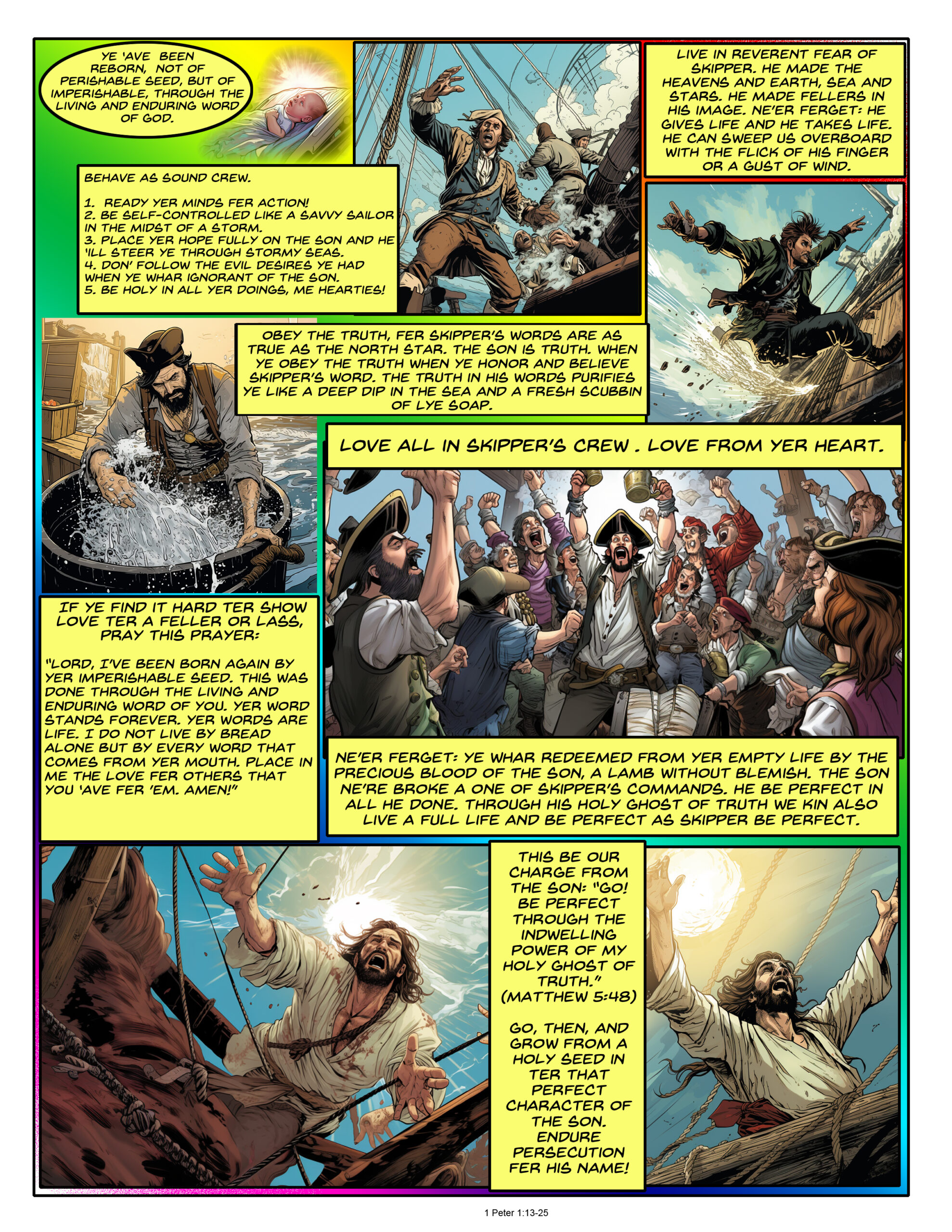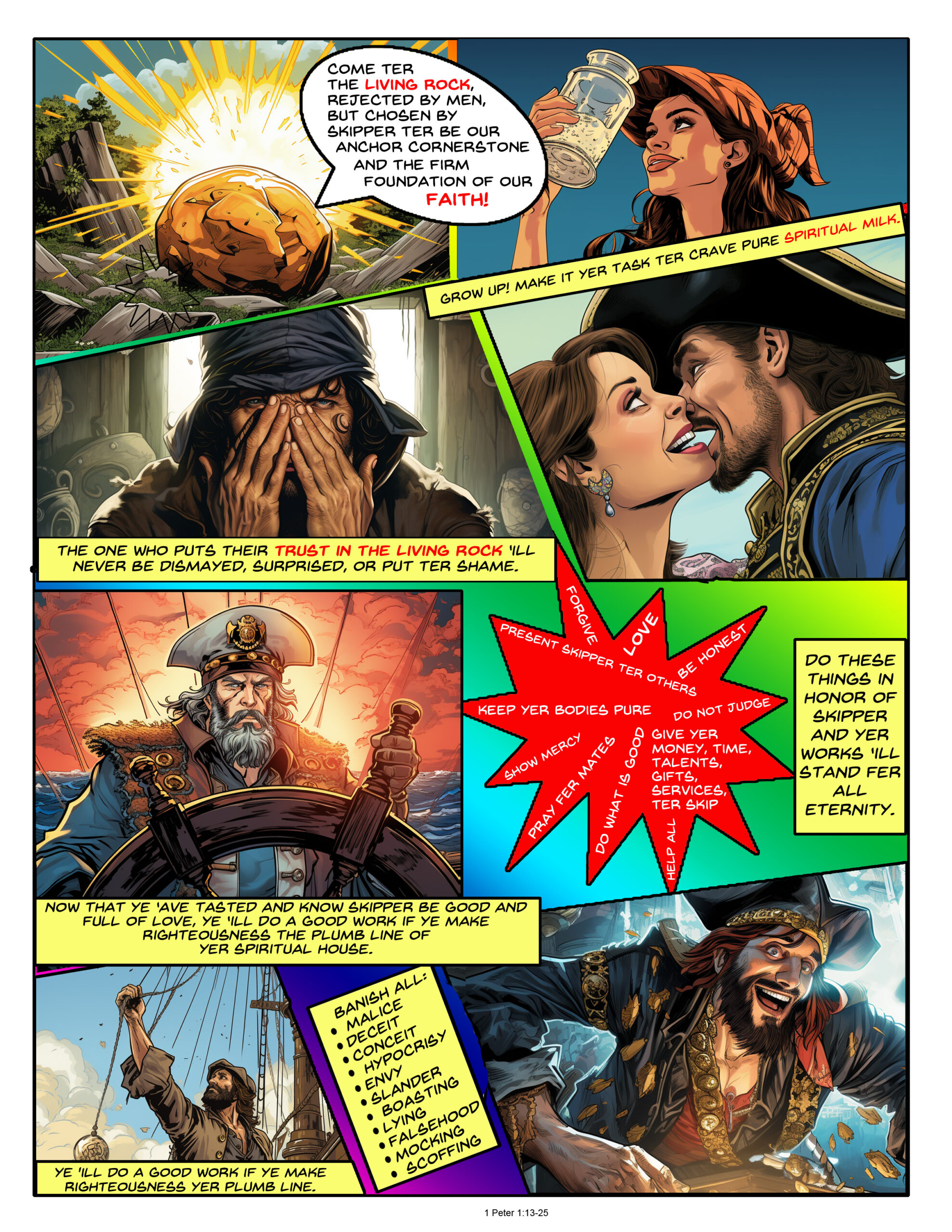 Lubber Opinion
Lubber Opinion
The views and opinions expressed by this lubber do not necessarily reflect the views or positions of the crew. Reader discretion be advised. – Staff
Build bridges of reconciliation when possible. When not, build rafts.
The Author of all Scripture
“When the Lord finished speaking to Moses on Mount Sinai, he gave Moses the two tablets of the covenant law, the tablets of stone inscribed by the finger of God.” (Deuteronomy 9:10)
But when Moses come off tha mountain and seen tha people partying and worshiping ah golden calf, he pitched a fit, tossed down tha tablets, and broke ’em. Back up tha mountain Moses trekked.
Tha Lord said ter Moses:
“Chisel out two stone tablets like the first ones, and I will write on them the words that were on the first tablets, which you broke. (Exodus 34:1)
So Moses chiseled out two stone tablets like tha first ones and hiked back up Mount Sinai early in tha morning, as Skipper commanded. He carried tha two stone tablets in his hands. Then Skipper came down in tha cloud and stood thar and proclaimed his name, tha Lord. He passed in front of Moses, proclaiming … (Exodus 34:1-5) . . . well lots of things. Thar be a long section where Skipper recites commands ter Moses. Then … Skipper said ter Moses:
“Write down these words, for in accordance with these words I have made a covenant with you and with Israel.” (Exodus 34:27-28)
Moses was thar with tha Lord 40 days and 40 nights without eating bread or drinking water. And he wrote on tha tablets tha words of tha covenant—the Ten Commandments. (Exodus 34:27-28)
Afterward all tha Israelites came near him, and he gave ’em all tha commands tha Lord give him on Mount Sinai. (Exodus 34:32)
Given that Moses spent 40 days with Skipper on tha mountain, we might assume that Skip also shared tha tale of Adam and how sin come inter tha world, tha account of Noah and his family, and other earlier events.
Think on this a wee little bit: If Moses did not write tha first 5 books of Skipper’s Code of Conduct, then Moses be guilty of ascribing ter tha Holy Spirit of Truth an act which be false. If this be tha case, then Moses be guilty of tha unpardonable sin that leads to eternal death.
“Anyone who speaks against (lies about) the Holy Spirit will not be forgiven, either in this age or in the age to come.” (Matthew 12:31-32)
And yet ah good many years later we find Moses on tha Mount of Transfiguration speaking with tha Son. From this we kin conclude that tha soul of Moses whar not damned, but in fact be at peace with Skip and tha Son. This would seem ter affirm tha authenticity of Moses as Skip’s scribe.
It appears Skip also delegated part of tha dictation of his Law ter his angels, for we read:
“Now you have betrayed and murdered him (Christ) – you who have received the law that was given through angels but have not obeyed it.” (Acts 7:53)
“We must pay the most careful attention, therefore, to what we have heard, so that we do not drift away. For since the message spoken through angels was binding, and every violation and disobedience received its just punishment, how shall we escape if we ignore so great a salvation?” (Hebrews 2:1-3)
From thar earliest days, Skip’s people accepted that tha first 5 books of tha Hebrew Bible, which in Hebrew: תּוֹרָה, means “Instruction”, “Teaching” or “Law” whar written by Moses under tha instruction of Skip and his Spirit.
According ter Saul Paul and Peter, tha words of Skipper be:
“God breathed” and inspired. “Fer all Scripture is God-breathed and is useful for teaching, rebuking, correcting and training in righteousness.” (2 Timothy 3:16)
“Prophecy never had its origin in the human will, but prophets, though human, spoke from God as they were carried along by the Holy Spirit.” (2 Peter 1:21)
“Who knows a person’s thoughts except their own spirit within them? In the same way no one knows the thoughts of God except the Spirit of God. What we have received is not the spirit of the world, but the Spirit who is from God, so that we may understand what God has freely given us. This is what we speak, not in words taught us by human wisdom but in words taught by the Spirit, explaining spiritual realities with Spirit-taught words. The person without the Spirit does not accept the things that come from the Spirit of God but considers them foolishness, and cannot understand them because they are discerned only through the Spirit. (1 Corinthians 2:11–16)
This be why each believer MUST have Skip’s Holy Spirit of Truth in ’em so as ter discern his will and words.
Tha Son affirmed Skip’s words when he said:
“Truly I tell you, until heaven and earth disappear, not the smallest letter, not the least stroke of a pen, will by any means disappear from the Law until everything is accomplished. (Matthew 5:18)
and
“Is it not written in your Law, ‘I have said you are “gods”’? (John 10:34)
“The ‘gods’ (men) know nothing, they understand nothing. They walk about in darkness; all the foundations of the earth are shaken. “I said, ‘You are “gods”; you are all sons of the Most High.’ But you will die like mere mortals; you will fall like every other ruler.” (Psalm 82:5-7)
“If he (the writer of Psalms) called them ‘gods,’ to whom the word of God came—and Scripture cannot be set aside— what about the one whom the Father set apart as his very own and sent into the world? Why then do you accuse me of blasphemy because I said, ‘I am God’s Son’? (John 10:34-36)
“You study the Scriptures diligently because you think that in them you have eternal life. These are the very Scriptures that testify about me, yet you refuse to come to me to have life.” (John 5:36) “Do not think I will accuse you before the Father. Your accuser is Moses, on whom your hopes are set. If you believed Moses, you would believe me, for he wrote about me. But since you do not believe what he wrote, how are you going to believe what I say?” (John 5:45)
“In the beginning was the Word, and the Word was with God, and the Word was God. He was with God in the beginning. Through him all things were made; without him nothing was made that has been made.” (John 1:1-3)
“For in him (Christ) all things were created: things in heaven and on earth, visible and invisible, whether thrones or powers or rulers or authorities; all things have been created through him and for him.” (Colossians 1:16)
“Heaven and earth will pass away, but my words will never pass away.” (Matthew 24:35-36)
“Truly I tell you, until heaven and earth disappear, not the smallest letter, not the least stroke of a pen, will by any means disappear from the Law until everything is accomplished.” (Matthew 5:18)
Moses testified ter tha authenticity of Skipper’s words.
Tha Son testified ter tha authenticity of Skipper’s words.
Tha Holy Spirit testifies ter tha authenticity of Skipper’s words.
Skip’s Law kin not save us, could never save us. We be saved ONLY through tha blood of tha Son. But tha law of Skipper does reveal his character, standards fer holiness, and our need fer him. Without Skip’s Law we would not have known our need fer a savior. (Galatians 3:19-26)
If Skip breathes life inter his words and thar be mistakes in his writings, then Skip makes mistakes.
If Skip makes mistakes, then he not be perfect.
If Skip is not perfect then his Son lied when he said:
“Be perfect, therefore, as your heavenly Father is perfect.” (Matthew 5:48)
If Skip’s Code of Conduct be simply a book of words cobbled together by mere men, then tha Son be a liar, not the perfect atonement fer our sin, could not and did not save us, and thar be no God, heaven, or hell.
Words matter. Skipper’s words matter most of all.
The Cost of Deceptive Doctrine
Deception poses ah greater risk ter believers in Christ than it does ter tha lost.
If we be in Christ, then we be shepherds. Our words and actions carry great weight. So as well, our errors in judgment.
“Not many of you should become teachers, my fellow believers, because you know that we who teach will be judged more strictly.” (James 3:1)
“If anyone causes one of these little ones—those who believe in me—to stumble, it would be better for them to have a large millstone hung around their neck and to be drowned in the depths of the sea.” (Matthew 18:6)
“Things that cause people to stumble are bound to come, but woe to anyone through whom they come. It would be better for them to be thrown into the sea with a millstone tied around their neck than to cause one of these little ones to stumble.” (Luke 17:1-2)
“Let us stop passing judgment on one another. Instead, make up your mind not to put any stumbling block or obstacle in the way of a brother or sister.” (Romans 14:13)
“Be careful, however, that the exercise of your rights does not become a stumbling block to the weak. For if someone with a weak conscience sees you, with all your knowledge, eating in an idol’s temple, won’t that person be emboldened to eat what is sacrificed to idols? So this weak brother or sister, for whom Christ died, is destroyed by your knowledge. When you sin against them in this way and wound their weak conscience, you sin against Christ. Therefore, if what I eat causes my brother or sister to fall into sin, I will never eat meat again, so that I will not cause them to fall.” (1 Corinthians 8:9-13)
Thar be no need ter go in ter all tha warnings ’bout false teachers. It be enough ter say that tha Son and others warned that our teaching needs ter be pure, rooted in tha Son, Skipper’s words and that we are ter avoid flimsy instruction, sowing sorry seed, and denying tha Son and his words.
Flimsy Instruction
If anyone teaches and does not agree to the sound instruction of our Lord Jesus Christ and to godly teaching, they are conceited and understand nothing. They have an unhealthy interest in controversies and quarrels about words that result in envy, strife, malicious talk, evil suspicions and constant friction between people of corrupt mind, who have been robbed of the truth and who think that godliness is a means to financial gain. (1 Timothy 6:3)
Teaching based on anything other than Skip’s Holy teaching always leads ter division.
Rotten Fruit
By their fruit you will recognize them. (Matthew 7:16)
Has thar ever been ah sin that, when in full bloom, produced ah good harvest?
Has adultery, fornication, and divorce produced better families, societies, and stronger crew in tha pews?
If we condone theft does it lead ter less lawlessness?
If we condone lying and cheating does it produce honesty and trust?
If we affirm injustice, bigotry, and intolerance, does it produce compassion and kindness?
We reap what we sow. Sow sorry seed and we ‘ill reap corruption and rotten fruit.
Denying Christ and His Words
“Whoever listens to you listens to me; whoever rejects you rejects me; but whoever rejects me rejects him who sent me.” (Luke 10:16)
If Christ made all things and we deny the words of Christ, then we deny Christ. Christ is the Word of God. His words are part of the very essence of who he is.
“The Word became flesh and made his dwelling among us.” (John 1:14)
Our Role as Shepherds, Mentors, Guides, Leaders, Teachers, Preachers
We be called ter affirm tha worth of every individual without affirming sin. This be tha core message of Romans 3:23 and John 3:16.
Because . . .
“All have sinned and fall short of the glory of God.” (Romans 3:23) “God loved the world so much that he gave his one and only Son, that whoever believes in him shall not perish but have eternal life.” (John 3:16)
In tha Son and in Truth we be called ter reach out ter and affirm them who be marginalized by society.
“Let the little children come to me, and do not hinder them.” (Matthew 19:14)
The Samaritan woman said to him, “You are a Jew and I am a Samaritan woman. How can you ask me for a drink?” (For Jews do not associate with Samaritans.) (John 4:9)
Jesus was indignant. He reached out his hand and touched the man. “I am willing,” he said. “Be clean!” Immediately the leprosy left him and he was cleansed. (Mark 1:41–42)
A Samaritan, as he traveled, came where the man was; and when he saw him, he took pity on him. (Luke 10:33, 37)
God demonstrates his own love for us in this: While we were still sinners, Christ died for us (all!). (Romans 5:8)
In our zeal ter help and love others and hold up Christ as our savior, let us avoid turning sin in ter an entitlement and right. We never be entitled ter sin, not ever.
When we die ter Christ, we give up all our rights. He alone be right, just, and true. He alone ‘ill see ter it we get justice and ah fair shake.
All be flawed. All be born steeped in sin and heaped upon with all manner of imperfections, perversions, and wicked thinking.
Tha Son came not ter affirm our sin. He also came not ter judge us based on how we be wired, made, configured. Rather, tha Son came ’cause he took pity on us. He seen how broken we be. He loves us. Love us so much, that he died to set us free from sin.
Tha devil seeks ter bind us in sin. Tha Son seeks ter break tha chains of sin.
Thar be ah very fine line between an inclination ter sin and the act of sin.
As leaders and teachers, let us be wise in how we guide, fer Skipper will judge ever thought of tha heart and act of tha hands.
“Woe unto them who call evil good and good evil, who put darkness for light and light for darkness.” (Isaiah 5:20)
The decisions we make ter day ‘ill impact tha souls of ’em we may never meet.
As leaders and teachers we need ter be skilled in discerning tha difference between sin and sinners — between affirming people as they are without tha Son while also calling ’em ter holiness in tha Son.
It be ah familiar saying, but still true: Skip loves tha sinner and hates sin. Tha Son loves us as we are, but praise be ter him, he never leaves us as we are. He loves us ter much ter allow us ter remain in bondage ter sin.
Build bridges of reconciliation when possible.
When not, build rafts, so that when those living in darkness reach tah end of themselves and be desperate fer help, they find ah welcoming face eager ter take ’em in and lead ’em ter tha Son.
 You have been born again, not of perishable seed, but of imperishable, through the living and enduring word of God. – 1 Peter 1:23 (1 Peter 1:22-25)
You have been born again, not of perishable seed, but of imperishable, through the living and enduring word of God. – 1 Peter 1:23 (1 Peter 1:22-25)
 Lubber Opinion
Lubber Opinion